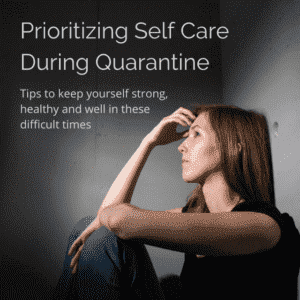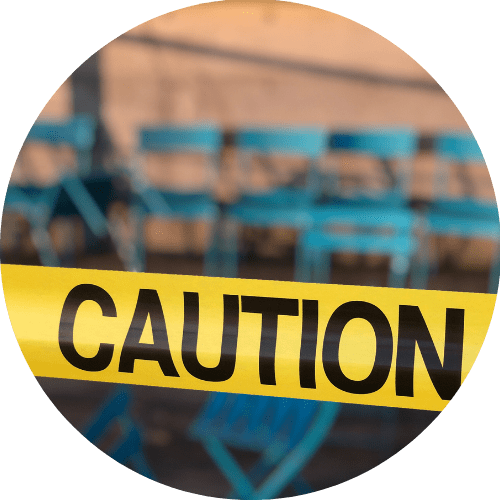By Amy Eiges
 These are extraordinary times we are all living through right now, and it would be easy to slip back into self-destructive behaviors, forgetting to make your own self-care a priority.
These are extraordinary times we are all living through right now, and it would be easy to slip back into self-destructive behaviors, forgetting to make your own self-care a priority.
Eating disorders, substance abuse and mental health issues thrive in isolation, and many of us are in seclusion right now, separated from friends and family with our normal routines completely disrupted. Add in a ridiculous amount of stress and fear, and it’s a recipe for disaster.
You are not alone in this, but that may be hard to remember in the moment. Please seek out and ask for the help you need. These are unprecedented times, and there is no shame in needing support. Here are a few other self-care reminders to keep you sane and healthy under insane circumstances:
- Connect.
Check in on loved ones, neighbors and friends – even those you think couldn’t possibly be feeling vulnerable. Trust me when I say – everyone is feeling uneasy now, even the toughest among us. Be of service to those who need it and help yourself in the process.
Call and talk to at least one person every day – it will help you and it will help them. Set up video calls and put them on your calendar like you would an important work meeting.
Learn how to use technology to see your loved ones’ faces as we all adjust to this new-normal. Pre-COVID our digital devices often gave us a false sense of connection, and we might have been using them to avoid meaningful interactions (texting instead of calling, screening calls, emailing to catch up instead of making plans to get together in person). Make an attempt to reach out to old friends, people you may have drifted away from, or an elderly relative or neighbor. - Turn. It. Off.
Limit news consumption and social media. If it’s making you anxious and your brain is spiraling out of control, set a timer, watch the news, get scared, get enraged and then out of self-preservation walk away and do what you need to do to get out of your head. The endless cable-TV news cycle, Twitter trolls, Facebook memes, videos your neighbor’s sister’s friend texted you about how we are all doomed? They will all be there when you log back in. - Keep a Schedule.
Set your alarm, make a plan for the day and stick to it. Get up and go about your day with a sense of purpose. Put things on your calendar that you would like to accomplish and try to get to sleep at your regular time. Not every day needs to be a marathon of productivity, but it will help your mental state to get something done. - Groom.
Wash your face, brush your hair, shower, get dressed, put on some makeup or shave, do your nails, wear clothing that isn’t stretchy (and doesn’t also serve as your pajamas). You will feel just a little bit better having done so. - Move.
Try to get sunlight and movement every day – it will help the anxiety and sleep. Again, put it in on your calendar like you would any important appointment. - Forgive.
Be kind to yourself. Forgive yourself if you are having trouble losing weight during this unbelievably stressful period or are unable to focus on long-forgotten goals during the downtime. Not every moment needs to be a hustle to accomplish a lengthy long-forgotten list of “shoulds” (I “should” study art history/take up viola, I “should” organize my closets and alphabetize my spice rack, I “should” be better at xyz). Sometimes the kindest thing you can do for yourself is take a mental health break and given all that’s going on around us (or not going on around us!), this includes taking a break from feeling bad about your perceived failings. - And Finally…. Garbage in, Garbage Out.
- Stay hydrated. Drink lots of water, seltzer, coffee and tea, but consider switching to decaf earlier in the day than you normally would. Being overly caffeinated is not going to help soothe frazzled nerves or regulate sleep that may be interrupted by anxiety, lack of exercise and/or changes in routine.
- Try to stick to a strict eating window of at least 16/8 (longer if you’re able), but also acknowledge that these are times of extraordinary stress, so have some-level of forgiveness and awareness that anxiety may prevent you from perfection. It’s ok. Really. Fasting is not a cumulative act. In other words – just because you don’t do it every day doesn’t negate the benefits of doing it most of the time. Keep at it and try again tomorrow.
- If you bought lots of food in bulk and are having a hard time not overeating, take those larger containers and break them in to individual serving sizes. In a supermarket frenzy, I bought a giant bag of mixed nuts. Suffice it to say that was not my wisest decision. After a few days of mindlessly and nervously eating them, I divided whatever was left over into individual bags and stored them in the freezer. Normally, I’d throw them away, but given that I’m trying to avoid going out too much, decided to keep them in a place that was out of eyeshot and where I would be forced to make a conscious decision to eat them by letting them defrost. My body is no longer a human garbage pail.
- If you do find yourself overeating, try to ask yourself if you are really hungry or are you bored, anxious, sad, scared, lonely (or all of the above)? If you choose to eat out of anything other than physical hunger, be kind to yourself (don’t add self-hatred to the list of things to be upset about!), but also be honest about and aware of what’s going on.
- If you ignore everything else on this list, I hope this stays with you: do everything in your power to keep low carb, even if it means binging low carb, as Dr. Tro often says. The more carbs you eat, the more you will want to eat, the stronger the cravings will be and the harder it will be to stay on track. And as more data emerges about COVID-19, we have more information about just how vulnerable being metabolically unwell leaves us. Now is not the time to hop back on the sugar/flour/carb rollercoaster.
- Use this time to embrace low carb with the renewed and deeper motivation of reclaiming your health. We know from experience that metabolic wellness can be achieved even before significant weight loss occurs. It’s not about what you look like on the outside – it’s about healing from the inside to keep yourself strong, healthy and well.
Amy Eiges is a health coach and reformed chronic dieter who is passionate about helping others recover from the diet-binge-gain-shame cycle she struggled with for years. Since discovering a ketogenic and low-carb lifestyle, she has lost over 180 pounds and has both reversed pre-diabetes and resolved lifelong depression. “When I was just starting out, facing 200 pounds to lose seemed insurmountable, and the idea I would ever be where I am now was unfathomable. Know this: I am not extraordinary. I just finally got the right advice, put one foot in front of the other and didn’t look back. I know now that it can be done, but after battling this war for 40 years I had lost hope that it was really, truly possible. I am living proof that it is.”





